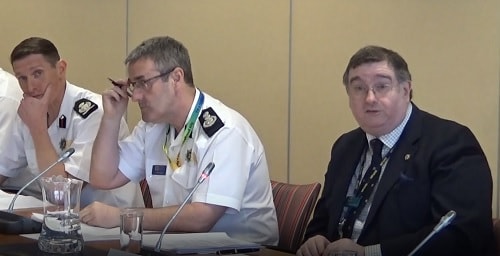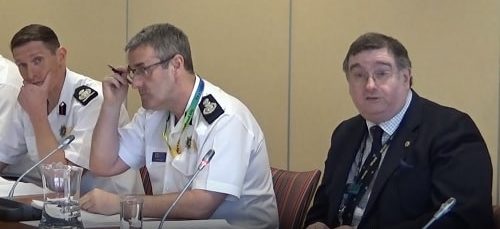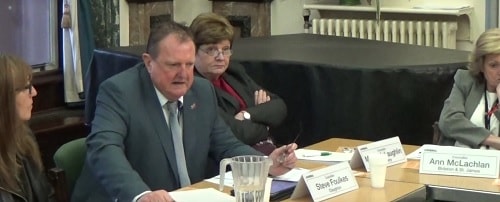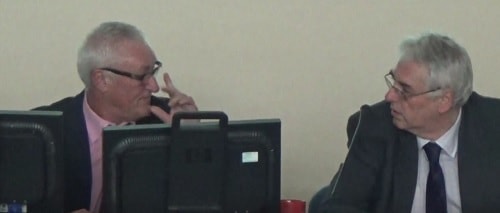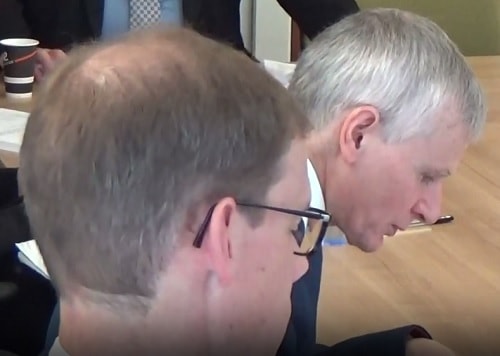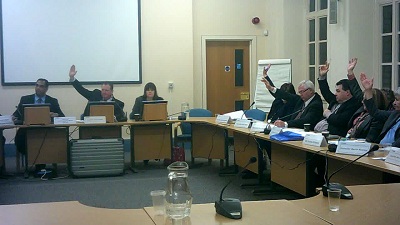
Labour councillors at a public meeting of Wirral Council’s Coordinating Committee vote to consult on closing Lyndale School (27th February 2014) (an example of the kind of meeting the regulations will cover)
Will you comment on the government’s new public meeting filming law before consultation ends on the 12th March?
Though the mills of DCLG grind slowly;
Yet they grind exceeding small;
Though with patience DCLG stands waiting,
With exactness grinds DCLG all.
(with apologies to Henry Wadsworth Longfellow)
As long-term readers of this blog will know I wrote last month about the government promise to introduce regulations to compel local councils (and some other bodies) to allow filming of their public meetings. This follows a power granted to Rt Hon Eric Pickles MP (by s.40 of the Local Audit and Accountability Act 2014) to bring forward some regulations (which he can do so at any point after 30th March 2014) to the Houses of Parliament.
Since last month draft regulations have been circulated as part of a consultation. Also part of the consultation is asking for suggestions to what to put in the accompanying plain English guide to the new regulations, which will be along similar lines to the fourteen page Your council’s cabinet: going to its meetings, seeing how it works – a guide for local people. DCLG [Department for Communities and Local Government] have sent copies of the draft regulations to the National Association of Local Councils (NALC), the Society of Local Authority Chief Executives (SOLACE), the Local Government Association (LGA) and Lawyers in Local Government (which was formed last year by the merger of Solicitors in Local Government (SLG) and ACSeS (Association of Council Secretaries and Solicitors)).
Queries on the draft regulations can be made to Hannah Brook (0303 444 1858 Hannah.brook@communities.gsi.gov.uk) or Eleanor Smyllie (Eleanor.smyllie@communities.gsi.gov.uk). Any comments (as part of the consultation) on the draft regulations are to go to Paul Roswell (Deputy Director – Democracy, Department for Communities and Local Government, 3/J1, Eland House, Bressenden Place, London, SW1E 5DU 0303 444 1858 paul.roswell@communities.gsi.gov.uk) by the 12th March 2014.
The new regulations are expected to be in force at the end of May 2014 or early June.
The draft regulation and an explanatory note are below. I’ve included hyperlinks where legislation is referred to.
Draft Regulations laid before Parliament under section 43 of the Local Audit and Accountability Act 2014, for approval by resolution of each House of Parliament.
================================================================================
DRAFT STATUTORY INSTRUMENTS
================================================================================
2014 No.
LOCAL GOVERNMENT, ENGLAND
The Openness of Local Government Bodies Regulations 2014
Made – – – – ***
Coming into force in accordance with regulation 1
The Secretary of State in exercise of the powers conferred by section 40 of the Local Audit and Accountability Act 2014(a), makes the following Regulations:
Part 1
General
Citation and commencement
- These regulations may be cited as the Openness of Local Government Bodies Regulations 2014 and come into force on the day after the day on which they are made.
Interpretation
- In these Regulations—
“the 1960 Act” means the Public Bodies (Admission to Meetings) Act 1960;
“the 1972 Act” means the Local Government Act 1972;
“the 2000 Act” means the Local Government Act 2000;
“the 2012 Regulations” means the Local Authorities (Executive Arrangements) (Meetings and Access to Information) (England) Regulations 2012.
Part 2
Admission to and Reporting of Meetings of Relevant Local Government Bodies
Amendment of the 1960 Act
- The 1960 Act is amended as follows—
(1) Insert after section 1(3)—
“(3A) Where any person is excluded from a meeting under subsection (2) and (3), a relevant local government body are also permitted to exclude and prevent persons from reporting using methods which can be carried out without that person’s presence.”
(2) Insert after section 1(4)(c)—
“(d) Where a meeting of a relevant local government body is required by this Act to be open to the public during the proceedings or any part of them, any person shall be permitted to attend that meeting or part for the purposes of reporting as defined by subsection (9).”
(3) In section 1(7) substitute ‘but nothing in this section’ with “but subject to paragraph (7A) nothing in this section”.
(4) Insert after subsection (7)—
“(7A) Any person shall be permitted to attend a meeting of a relevant local government body for the purposes of reporting as defined by subsection (8).”
(5) Insert after subsection (7)—
“(8) For the purposes of this section–
“relevant local government body” means—
(a) the Council of the Isles of Scilly;
(b) a parish council; or
(c) a parish meeting.
“reporting” means—
(a) filming, photographing or audio recording of proceedings;
(b) using any other means for enabling persons not present to see or hear proceedings of a meeting as it takes place or later; and
(c) reporting or providing commentary on proceedings of a meeting, orally or in writing, so that the report or commentary is available as the meeting takes place or later to persons not present.”
(6) After section 1 insert—
“1A. Publication and dissemination of reports
(1) Any persons who attend meetings of a relevant local government body with the aim of reporting under section 1(7A) may use any communication methods, including the internet to publish, post or otherwise share the results of their reporting activities.
(2) Publication and dissemination can take place at the time of the meeting or occur after the meeting.”
Amendment of the 1972 Act
4. The 1972 Act is amended as follows—
(1) After section 100A(5) insert—
“(5A) Where any person is excluded from a meeting under subsections (2)-(5), relevant local government bodies are also permitted to exclude and prevent persons from reporting using methods which can be carried out without that person’s presence.”
(2) In section 100A(6) for (c) substitute—
“(c) while the meeting is open to the public:
(i) duly accredited representatives of newspapers attending the meeting for the purpose of reporting the proceedings for those newspapers shall, so far as practicable, be afforded reasonable facilities for taking their report,
(ii) in relation to relevant local government bodies as defined in subsection (9) any person attending a meeting under subsection (7A) shall so far as practicable, be afforded reasonable facilities for taking their report.”
(3) Insert at the beginning of section 100A(7) “Subject to subsection (7A),”
(4) Insert after subsection (7)—
“(7A) (a) Any person shall be permitted to attend meetings of relevant local government bodies for the purposes of reporting as defined by subsection (10)
(b) Any persons who attend meetings of relevant local government bodies with the aim of reporting may use any communication methods, including the internet, to publish, post or otherwise share the results of their reporting activities
(c) Publication and dissemination can take place at the time of the meeting or occur after the meeting”
(5) Insert after subsection (8)—
“(9) For the purposes of this section–
“relevant local government bodies” means—
(a) a district council,
(b) a county council in England,
(c) a London borough council,
(d) the London Assembly,
(e) the Common Council of the City of London in its capacity as a local authority or police authority,
(f) the London Fire and Emergency Planning Authority,
(g) Transport for London,
(h) a joint authority established under Part 4 of the Local Government Act 1985,
(i) an economic prosperity board,
(j) a combined authority,
(k) a fire and rescue authority in England constituted by a scheme under section 2 of the Fire and Rescue Services Act 2004 or a scheme to which section 4 of that Act applies,
(l) a National Park Authority for a National Park in England,
(m) the Broads Authority, or
(n) any committee, joint committee or sub-committee of the above bodies.
(10) Reporting for the purposes of subsection (7A) is defined as—
(a) filming, photographing or audio recording of proceedings,
(b) using any other means for enabling persons not present to see or hear proceedings of a meeting as it takes place or later, and
(c) reporting or providing commentary on proceedings of a meeting, orally or in writing, so that the report or commentary is available as the meeting takes place or later to persons not present.”
Amendment of the 2012 Regulations
5. The 2012 Regulations are amended as follows—
(1) In regulation 4 insert after subsection (6)—
“(7) Subject to subsections (2)-(5), a decision-making body is required to permit any person attending a meeting of such a body to report on the proceedings.
(8) For the purposes of this regulation, report on proceedings is defined as—
(a) filming, photographing or audio recording the proceedings of a meeting,
(b) using any other means for enabling persons not present to see or hear proceedings of a meeting as it takes place or later, and
(c) reporting or providing commentary on proceedings of a meeting, orally or in writing, so that the report or commentary is available to persons not present, as the meeting takes place or later.
(9) Any person who attends a meeting to report on proceedings under subsection (7) may use any communication methods, including the internet, to publish, post or otherwise share the results of their reporting activities. Publication and dissemination can take place at the time of the meeting or occur after the meeting.”
(2) After regulation 4(5) insert—
“(5A) Where any person is excluded from a meeting under subsections (2)-(5), a decision making body is also permitted to exclude and prevent persons from reporting using methods which can be carried out without that person’s presence.”
(3) In regulation 20 omit paragraph (4).
Part 3
Record of Decisions and Access to Documents
Interpretation of this Part
6. For the purposes of this Part—
“confidential information” means –
(a) Information provided to the local authority by a government department on terms (however expressed) which forbid the disclosure of the information to the public; or
(b) Information the disclosure of which to the public is prohibited by or under any enactment or by order of a court,
and in either case, a reference to the obligation of confidence is to be construed accordingly.
“decision making officer” means an officer of a relevant local government body who makes decisions on behalf of their relevant local government body, with authority to do so.
“exempt information” has the meaning given by section 100I of the 1972 Act (exempt information and power to vary Schedule 12A).
“open meeting” means a meeting of a relevant local government body to which any person who is not a member of that body may also attend.
“proper officer” has the same meaning as in section 270(3) of the 1972 Act (general provisions as to interpretation.
“relevant local government body” means—
(c) a district council,
(d) a county council in England,
(e) a London borough council,
(f) the Greater London Authority,
(g) the Common Council of the City of London in its capacity as a local authority or police authority,
(h) the London Fire and Emergency Planning Authority,
(i) Transport for London,
(j) a joint authority established under Part 4 of the Local Government Act 1985,
(k) an economic prosperity board,
(l) a combined authority,
(m) a fire and rescue authority in England constituted by a scheme under section 2 of the Fire and Rescue Services Act 2004 or a scheme to which section 4 of that Act applies,
(n) a National Park Authority for a National Park in England,
(o) the Broads Authority,
(p) the Council of the Isles of Scilly,
(q) a parish council, or,
(r) a parish meeting.
Recording of decisions
7.—(1) The decision making officer or other suitable officer within a relevant local government body is required to produce a written record of any decision which falls within paragraph (2).
(2) A decision falls within this paragraph if it would otherwise have been taken by the relevant local government body, or a committee, sub-committee or joint committee of that body but it has been delegated to an officer of that body either—
(a) under a specific express authorisation; or
(b) under a general authorisation to officers to take such decisions and, the effect of the decision is to—
(i) grant permissions or licences;
(ii) affect the rights of individuals;
(iii) award contracts; or
(iv) incur expenditure which materially affects that relevant local government body’s financial position.
(3) The written record should be produced as soon as reasonably practicable after an officer has made a decision of the kind in paragraph (2) and should contain the information specified in paragraph (4).
(4) The record required by paragraph (1) must contain the following information—
(a) the title of the decision making officer;
(b) the date the decision was taken;
(c) a record of the decision taken along with reasons for the decision;
(d) details of alternative options considered and rejected; and
(e) where the decision falls under paragraph 2(a), the names of any member of a relevant local government body who has declared a conflict of interest in relation to the decision.
Decisions to be made available to the public
8.—(1) The written records described in regulation 7, along with any connected or supporting documents, must as soon as reasonably practicable be made available to the public—
(a) at the offices of the relevant local government body;
(b) on website of the relevant local government body, if it has one; and,
(c) through any other means thought appropriate by the relevant local government body.
(2) On request and on receipt of payment of postage, copying or other necessary charge for transmission, the relevant body must provide subject to regulation 9—
(a) a copy of the written decision.
(b) a copy of connected and supporting documents.
(3) Any written record required by paragraph (1) to be available for inspection by members of the public, must be retained by the relevant local government body and made available for inspection by the public for a period of at least 6 years beginning on the date on which the decision, to which the record relates, was made.
(4) Any connected or supporting documents relating to a decision to which a record must be made under regulation 7 which is required to be available for inspection by the public by paragraph (1), must be retained by the relevant local government body and made available for inspection by the public for a period of at least 4 years beginning on the date on which the decision, to which the record relates, was made.
Confidential and Exempt information
9.—(1) Nothing in this Part is to be taken to authorise or require the disclosure of confidential information in breach of the obligation of confidence.
(2) Nothing in this Part—
(a) authorises or requires a relevant local government body to disclose to the public or make available for public inspection any document or part of a document if, in the opinions of the proper officer, that document or part of a document contains or may contain confidential information; or
(b) requires a relevant local government body to disclose to the public or make available for public inspection any document or part of a document if, in the opinion of the proper officer, that document or part of a document contains or is likely to contain exempt information.
Offences
10.—(1) A person who has custody of a document which is required by regulation 8 to be available for inspection by members of the public commits an offence if, without reasonable excuse, that person—
(a) intentionally obstructs any person exercising a right conferred under this Part in relation to inspecting written records and connected and supporting documents; or
(b) refuses any request under this Part to provide written records and connected and supporting documents.
(2) A person who commits an offence under paragraph (1) is liable on summary conviction to a fine not exceeding level 1 on the standard scale.
EXPLANATORY NOTE
(This note is not part of these Regulations)
DESCRIPTIVE SUMMARY OF THE DRAFT OPENNESS OF LOCAL GOVERNMENT BODIES REGULATIONS 2014
The Regulations amend the:
Admission to and reporting of Meetings of Relevant Local Government Bodies
The Regulations:
- Allow any person to attend a public meeting of a relevant local government body for the purposes of reporting.
- ‘Reporting’ is defined in the regulations as:
- Filming, photographing or audio recording of proceedings;
- Using any other means for enabling persons not present to see or hear proceedings of a meeting as it takes place or later; and
- Reporting or providing commentary on proceedings of a meeting, orally or in writing.
- Allow any persons with the aim or reporting to use any communication methods, including the internet, to publish, post or otherwise share the results of their reporting activities, during or after the meeting.
- Do not affect the current circumstances in which a private meeting may be held or a person may be excluded (for example, where exempt information would be disclosed or in the case of disorderly conduct).
Regulation 3 amends the 1960 Act to apply the policy to:
- parish councils;
- parish meetings; and
- the Council of the Isles of Scilly.
Regulation 4 amends the 1972 Act to apply this policy to:
- a district council,
- a county council in England,
- a London borough council,
- the London Assembly
- the Common Council of the City of London in its capacity as a local authority or police authority,
- the London Fire and Emergency Planning Authority,
- Transport for London,
- a joint authority established under Part 4 of the Local Government Act 1985,
- an economic prosperity board,
- a combined authority,
- a fire and rescue authority in England constituted by a scheme under section 2 of the Fire and Rescue Services Act 2004 or a scheme to which section 4 of that Act applies,
- a National Park Authority for a National Park in England
- the Broads Authority, or
- any committee, joint committee or sub-committee of the above bodies (this includes Police and Crime Panels and Health and Wellbeing Boards).
Regulation 5 amends the 2012 Regulations to apply the policy to councils operating executive arrangements to ensure a consistent approach.
Record of Decisions and Access to Documents
The Regulations also:
- Require a written record to be made of any decision that has been delegated to an officer of the relevant local government body under a specific express authorisation, or under a general authorisation where the effect of the decision is to grant permissions or licences, affect the rights of individuals, award contracts or incur expenditure which materially affects the body’s financial position.
- Require that the written records are made available to the public at the relevant body’s offices, on their website if they have one, by post if requested and on receipt of payment for copying and postage, and through any other means thought appropriate by the local government body.
- Require the written record to be available for public inspection for at least 6 years, and any supporting documentation for at least 4 years.
- Provide a criminal penalty for non-compliance. A person who has custody of documents which should be available for inspection, will commit an offence if that person refuses to disclose or intentionally obstructs the disclosure of such documents under these Regulations. The penalty for the offences is a fine not exceeding level 1 – that is £200 – on the standard scale. This replicates the existing penalty for failure to disclose or obstructing the disclosure of documents in the Local Authorities (Executive Arrangements) (Meetings and Access to Information) (England) Regulations 2012.
This part of the Regulations applies to the same local government bodies as listed above, but will not apply to decisions on executive matters in councils operating executive arrangements as there are already equivalent provisions in the 2012 Regulations to cover these decisions.
If you click on any of the buttons below, you’ll be doing me a favour by sharing this article with other people.
53.402022-3.070415
